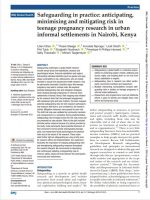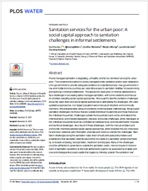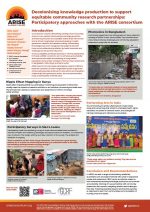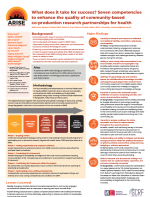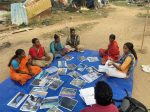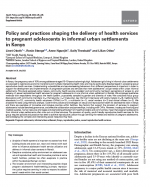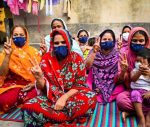Abstract This article critically reviews the literature on urban informality, inequity, health, well-being and accountability to identify key conceptual, methodological and empirical gaps in academic and policy discourses. We argue that critical attention to power dynamics is often a key missing element in these discourses and make the case for explicit attention to the operation […]
Abstract Safeguarding challenges in global health research include sexual abuse and exploitation, physical and psychological abuse, financial exploitation and neglect. Intersecting individual identities (such as gender and age) shape vulnerability to risk. Adolescents, who are widely included in sexual and reproductive health research, may be particularly vulnerable. Sensitive topics like teenage pregnancy may lead to […]
Abstract Poorly managed sanitation is degrading, unhealthy and far too dominant among the urban poor. The conventional solution to poorly managed onsite sanitation and/or open defecation is for governments to provide adequate sanitation at subsidised prices. Few governments in low and middle income countries can subsidise access to sanitation facilities for people living and working […]
Waste workers-otherwise known as sanitation workers-are often made invisible due to informal work arrangements. In India, as in other parts of the world, sanitation workers tend to be from the oppressed and marginalized communities with little access to healthcare and quality health services. This despite, their work being highly important to society and exposing them […]
Co-production requires dismantling existing power hierarchies. As such, it can support decolonising knowledge generation and fostering inclusive and equitable relationships with diverse (and at times) marginalised actors participating in health governance, research and decision-making. Decolonising knowledge production recognises that expertise lies with those communities directly affected by health inequities and challenges as well as other […]
Decolonising health research requires a shift to inclusive processes, and actively engaging with communities. Community-based participatory research (CBPR) fosters collaboration among communities, researchers, and implementers to produce contextual knowledge for action. Enhancing co-production skills and competencies has been shown to improve research quality and validity, while CBPR principles have been developed, limited guidance exists on […]
Waste pickers in India are extremely vulnerable to a range of health problems due to their poor living and unsafe working conditions, and struggle to access the health services they are entitled to. This research uses a community-based participatory research and focuses specifically on vector-borne diseases in two districts of Andhra Pradesh, exploring how they […]
In Kenya, the pregnancy rate of 15% among adolescents aged 15–19 years is alarmingly high. Adolescent girls living in informal urban settlements are exposed to rapid socio-economic transitions and multiple intersecting health risks and may be particularly disadvantaged in accessing sexual reproductive health services. Understanding vulnerabilities and service-seeking behaviours from different perspectives is important in order […]
In this episode of the Health Policy and Planning Podcast, LSHTM’s Public Engagement Manager, Karl Byrne is joined by our colleague Linet Okoth from LVCT Health. They talk about her paper “Policy and practices shaping the delivery of health services to pregnant adolescents in informal urban settlements in Kenya.” It’s a fascinating conversation that covers […]
This photo-narrative book was developed with community members from Green Land (Khulna), Bajekazla (Rajshahi) and Shyampur (Dhaka) communities, as part of the ARISE Responsive Fund in Bangladesh. It tells the stories of how many marginalised people in urban informal settlements of Bangladesh were affected by the COVID-19 pandemic, and how they came together to respond […]

